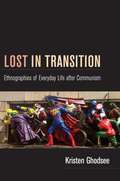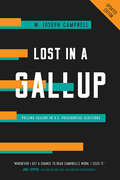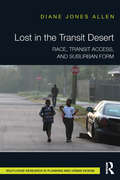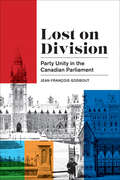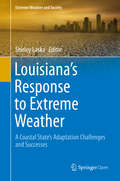- Table View
- List View
Lost and Broken: My Journey Back from Chronic Pain and Crippling Anxiety
by Congressman Adam SmithAdam Smith, 26-year member of Congress and Chair of the House Armed Services Committee for the last four years, offers a candid memoir about his years-long struggle with anxiety and chronic pain, and the winding path to find the right diagnosis and treatment.&“Early one morning in April of 2016 I woke up and seriously contemplated the possibility that I would never be able to generate the strength, focus, and courage to get out of bed. The combination of crippling anxiety, chronic pain, muscle atrophy, and the fascinating mix of pharmaceuticals coursing through my body had, I feared, finally broken me. My life terrified me. I had been fighting some combination of these battles for just over three years at this point, and I didn&’t think I could do it for one more day.&” Representative Adam Smith was successful by all measures, with a long, distinguished career in Congress and a loving marriage with children. Yet seemingly out of nowhere, his body and mind broke down to the point where every day was a relentless struggle to just keep moving. It&’s a struggle millions of Americans know all too well. Would he be able to meet his responsibilities as a husband and father? Could he still maintain his breakneck professional schedule and continue to do his job well? He soon realized he couldn&’t will himself well—he needed help. Thus began a desperate search for the right diagnosis and treatment for his mental and physical pain that lasted over six years and involved more than a hundred different health care providers. With unflinching honesty, Smith reveals how he got to this lowest point in life, and how he slowly, painfully, and unevenly found his way back to having a calmer mind and being free of chronic pain and medication. Smith discovered the severe limitations of our nation&’s health care system, and brought him face to face with the cost of the stigma our country has against admitting to and dealing with mental health issues. He learned that life isn&’t about finding that quick fix or clear-cut mental and physical program to stop worrying and struggling. It&’s about learning who you are, understanding your body and mind well enough to face those struggles that we will all inevitably face, and then being able to enjoy your life even when those struggles come.
Lost in America: A Dead-End Journey
by Colby Buzzell"Nothingless than the soul of an extremely interesting human being at war on ourbehalf." —Kurt VonnegutAstunning portrait of modern America by Colby Buzzell,the critically acclaimed author of My War: Killing Time in Iraq.Recounting his five-month journey through the country, from its thrivingcoastlines to its rust-belt wrecks, Buzzell reveals aparadoxical landscape of American dreams both achieved and broken, manifestdestinies claimed and refuted, and community ties pulled apart and patchedtogether. In the tradition of John Steinbeck’s Travels with Charley, Buzzell’s Lost in America uncovers the starkrealities of our national character even as it explores the deepest questionsof identity, unity, and fatherhood.
Lost in Austin: The Evolution of an American City
by Alex HannafordA long-time Austinite and journalist’s exploration of the profound movements that have shaped Austin, Texas—charting the shifts within its vibrant music scene, the impact of rapid urbanization, and the challenges of gentrification—ultimately questioning what this city’s transformation signals for American urban identity.Austin isn’t what it used to be.This is a common sentiment amongst locals, offered with the same confused—and often disappointed—tone familiar to residents of Seattle, Portland, or San Francisco, where rapid growth and expansion have led to an urban identity crisis. Like those cities, Austin is known for its unique qualities: a thriving live music scene and housing affordability that historically made it a compelling home for creatives and self-described weirdos to roost. But now, as Big Tech infiltrates and climate change looms, Austin has become less familiar—and far less affordable.An exploration of the beloved city’s evolution, Lost in Austin also serves as a critical exploration of the transformation that has befallen one of America’s most beloved cities—and serves as a warning for what the homogenization of cities means for American urban identity. With a journalist’s perspective and the heart of an Austinite, Alex Hannaford delves into the consequences of the city’s rapid growth in chapters that chronicle the major movements permanently altering the city: a vanishing music scene, soaring property values, and the encroachment of major industry. Through keen reportage and extensive interviews, Lost in Austin unveils the toll of unchecked growth and the city’s shift from its rebellious spirit to commercialization.Through those stories—vibrant, colorful, and clearly full of love for this city—Hannaford raises a crucial question: How do American cities, once celebrated for their unique values, became casualties of their own rapid growth and success? And can they ever return to what they once were?
Lost in Transition: Ethnographies of Everyday Life After Communisim
by Kristen GhodseeLost in Transition tells of ordinary lives upended by the collapse of communism. Through ethnographic essays and short stories based on her experiences with Eastern Europe between 1989 and 2009, Kristen Ghodsee explains why it is that so many Eastern Europeans are nostalgic for the communist past. Ghodsee uses Bulgaria, the Eastern European nation where she has spent the most time, as a lens for exploring the broader transition from communism to democracy. She locates the growing nostalgia for the communist era in the disastrous, disorienting way that the transition was handled. The privatization process was contested and chaotic. A few well-connected foreigners and a new local class of oligarchs and criminals used the uncertainty of the transition process to take formerly state-owned assets for themselves. Ordinary people inevitably felt that they had been robbed. Many people lost their jobs just as the state social-support system disappeared. Lost in Transition portrays one of the most dramatic upheavals in modern history by describing the ways that it interrupted the rhythms of everyday lives, leaving confusion, frustration, and insecurity in its wake.
Lost in a Gallup: Polling Failure in U.S. Presidential Elections
by W. Joseph CampbellA guide to the messy and contentious past of US presidential pre-election polls and why they aren’t as reliable as we think. Donald Trump’s unexpected victory in the 2016 U.S. presidential election brought sweeping criticism of election polls and poll-based statistical forecasts, which had signaled that Hillary Clinton would win the White House. Surprise ran deep in 2016, but it was not unprecedented. Lost in a Gallup examines in lively and engaging fashion the history of polling flops, epic upsets, unforeseen landslides, and exit poll fiascoes in American presidential elections. Drawing on archival collections and contemporaneous sources, W. Joseph Campbell presents insights on notable pollsters of the past, including George Gallup, Elmo Roper, Archibald Crossley, Warren Mitofsky, and Louis Harris.The story is one of media failure, too, as journalists invariably take their lead from polls in crafting campaign narratives. Lost in a Gallup describes how numerous prominent journalists—including Edward R. Murrow, Jimmy Breslin, Mike Royko, Christopher Hitchens, and Haynes Johnson—were outspoken poll-bashers and critics. In assessing polling’s messy, uneven, and controversial past, Campbell emphasizes that although election polls are not always wrong, their inherent drawbacks invite skepticism and wariness. Readers will come away better prepared to weigh the efficacy and value of pre-election polls in presidential races, the most important of all American elections.
Lost in a Gallup: Polling Failure in U.S. Presidential Elections
by W. Joseph CampbellThis update of a lively, first-of-its-kind study of polling misfires and fiascoes in U.S. presidential campaigns takes up pollsters’ failure over the decades to offer accurate assessments of the most important of American elections.Lost in a Gallup tells the story of polling flops and failures in presidential elections since 1936. Polls do go bad, as outcomes in 2020, 2016, 2012, 2004, and 2000 all remind us. This updated edition includes a new chapter and conclusion that address the 2020 polling surprise and considers whether polls will get it right in 2024. As author W. Joseph Campbell discusses, polling misfires in presidential elections are not all alike. Pollsters have anticipated tight elections when landslides have occurred. They have pointed to the wrong winner in closer elections. Misleading state polls have thrown off expected national outcomes. Polling failure also can lead to media error. Journalists covering presidential races invariably take their lead from polls. When polls go bad, media narratives can be off-target as well. Lost in a Gallup encourages readers to treat election polls with healthy skepticism, recognizing that they could be wrong.
Lost in the Cold War: The Story of Jack Downey, America’s Longest-Held POW (A Nancy Bernkopf Tucker and Warren I. Cohen Book on American–East Asian Relations)
by Thomas Christensen John T. Downey Jack DowneyIn 1952, John T. “Jack” Downey, a twenty-three-year-old CIA officer from Connecticut, was shot down over Manchuria during the Korean War. The pilots died in the crash, but Downey and his partner Richard “Dick” Fecteau were captured by the Chinese. For the next twenty years, they were harshly interrogated, put through show trials, held in solitary confinement, placed in reeducation camps, and toured around China as political pawns. Other prisoners of war came and went, but Downey and Fecteau’s release hinged on the United States acknowledging their status as CIA assets. Not until Nixon’s visit to China did Sino-American relations thaw enough to secure Fecteau’s release in 1971 and Downey’s in 1973.Lost in the Cold War is the never-before-told story of Downey’s decades as a prisoner of war and the efforts to bring him home. Downey’s lively and gripping memoir—written in secret late in life—interweaves horrors and deprivation with humor and the absurdities of captivity. He recounts his prison experiences: fearful interrogations, pantomime communications with his guards, a 3,000-page overstuffed confession designed to confuse his captors, and posing for “show” photographs for propaganda purposes. Through the eyes of his captors and during his tours around China, Downey watched the Great Leap Forward, the Cultural Revolution, and the drastic transformations of the Mao era. In interspersed chapters, Thomas J. Christensen, an expert on Sino-American relations, explores the international politics of the Cold War and tells the story of how Downey and Fecteau’s families, the CIA, the U.S. State Department, and successive presidential administrations worked to secure their release.
Lost in the System: Miss Tennessee U.S.A.'s Triumphant Fight to Claim a Family of Her Own
by Charlotte Lopez Susan DworkinFormer Miss Teen USA recounts her experience being in Vermont's foster care system, and how she beat the odds.
Lost in the Transit Desert: Race, Transit Access, and Suburban Form
by Diane Jones AllenIncreased redevelopment, the dismantling of public housing, and increasing housing costs are forcing a shift in migration of lower income and transit dependent populations to the suburbs. These suburbs are often missing basic transportation, and strategies to address this are lacking. This absence of public transit creates barriers to viable employment and accessibility to cultural networks, and plays a role in increasing social inequality. This book investigates how housing and transport policy have played their role in creating these "Transit Deserts," and what impact race has upon those likely to be affected. Diane Jones Allen uses research from New Orleans, Baltimore, and Chicago to explore the forces at work in these situations, as well as proposing potential solutions. Mapping, interviews, photographs, and narratives all come together to highlight the inequities and challenges in Transit Deserts, where a lack of access can make all journeys, such as to jobs, stores, or relatives, much more difficult. Alternatives to public transit abound, from traditional methods such as biking and carpooling to more culturally specific tactics, and are examined comprehensively. This is valuable reading for students and researchers interested in transport planning, urban planning, city infrastructure, and transport geography.
Lost on Division: Party Unity in the Canadian Parliament (Political Development: Comparative Perspectives)
by Jean-François GodboutCompared to other countries, Canada’s Parliament shows a high level of party unity when it comes to legislative voting. This was not always the case, however. One hundred years ago, this sort of party discipline was not as evident, leading scholars to wonder what explains the growing influence of political parties in the Canadian Parliament. In Lost on Division, Jean-François Godbout analyses more than two million individual votes recorded in the House of Commons and the Senate since Confederation, demonstrating that the increase in partisanship is linked to changes in the content of the legislative agenda, itself a product of more restrictive parliamentary rules instituted after 1900. These rules reduced the independence of private members, polarized voting along partisan lines, and undermined Parliament’s ability to represent distinct regional interests, resulting in – among other things – the rise of third parties. Bridging the scholarship on party politics, legislatures, and elections, Lost on Division builds a powerful case for bringing institutions back into our understanding of how party systems change. It represents a significant contribution to legislative studies, the political development literature, and the comparative study of parliaments.
Lost on Earth: Nomads of the New World
by Mark FritzThis book is a visit to a misunderstood world, a veritable refugee nation, a shadowland of outlanders that overlaps uncomfortably with our own world, but which exists very much in a different dimension governed by its own rules for survival.
Lost to the World: A Memoir of Faith, Family, and Five Years in Terrorist Captivity
by Shahbaz TaseerShahbaz Taseer’s memoir of his five-year-long captivity at the hands of the Islamic Movement of Uzbekistan. In late August 2011, Shahbaz Taseer was dragged from his car at gunpoint and kidnapped by members of the Islamic Movement of Uzbekistan (IMU), a Talibanaffiliated Uzbek terrorist group. Taseer’s father, the governor of Punjab, Pakistan, had recently been assassinated for speaking in support of a Christian woman who had been accused of blasphemy and sentenced to death. Though Taseer himself wasn’t involved in politics, he was still a public figure who represented a more tolerant, internationally connected Pakistan that the IMU condemned. What followed his kidnapping was nearly five years of torture and constant peril as Taseer was held captive by the IMU in the ungoverned reaches of Pakistan and Afghanistan, his fate subject to the unpredictable whims and machinations of terrorists. Lost to the World is his memoir of that time—a story of extraordinary sorrow but also of empathy and faith.While deeply harrowing, this tale is also about resilience. Taseer countered his captors’ narrative of a holy war by immersing himself in the Quran in search of hope and a means to see his own humanity under even the most inhumane conditions, and ultimately to find a way back to his family.
Louder Than the Lies: Asian American Identity, Solidarity, and Self-Love
by Ellie Yang CampA primer on racism that offers an intersectional, anti-racist, coalition-building view of Asian American identity."This is and will be a necessary and useful tool for generations to come." —Jenny Wang, author of Permission to Come HomeWhat does it mean to be Asian American? How does our racialization in the United States shape our lives and our worldviews? With candor and care, Ellie Yang Camp, a Taiwanese American educator, offers a set of ideas and frameworks to guide us toward a more nuanced understanding of these questions. Drawing on her experiences and observations from history, conversations with Asian American peers, and lessons derived from other people of color, Camp unpacks the confusing dynamics that underlie anti-Asian stigmas and stereotypes in the US. From the model minority myth to yellowface to anti-Blackness among Asian communities, Camp presses into hard questions and moments of discomfort, naming fears so that we might dispel them.Key stories of resistance reveal the importance of solidarity, both among the diverse people under the Asian American umbrella and with all who are exploited by white supremacy. Acknowledging that racism is a system thrust upon us to control us, Camp fuels our boldness to challenge tropes, dismantle prejudices, and embrace self-determination as an act of radical liberation.
Louie on the Rocks: A Novel
by Meredith O'BrienFor fans of Tom Perrotta, Maria Semple, and Elinor Lipman, a dark comedy about family dysfunction fueled by bitter Trump-era politics, vodka, and a reluctant daughter&’s guilt.Set against a backdrop of bitterly partisan Facebook feuds and a Trump flag set aflame in a driveway, Louie on the Rocks follows the disintegration of the Francis family six months after the premature death of their matriarch, Helen. In his wife&’s absence, retired MAGA patriarch Louie descends into an alcoholic spiral and his liberal, queer, bookseller daughter Lulu responds, in a clumsy attempt to save her father from himself, by taking him to court to seize control over his finances. Told by Louie, Lulu, and Helen—who is watching in horror from the great beyond—this is the tale of a trio with very different takes on the messy events of 2019.
Louis Sébastien Mercier: Revolution and Reform in Eighteenth-Century Paris (Transits: Literature, Thought & Culture, 1650-1850)
by Michael J. MulryanFrench playwright, novelist, activist, and journalist Louis Sébastien Mercier (1740–1814) passionately captured scenes of social injustice in pre-Revolutionary Paris in his prolific oeuvre but today remains an understudied writer. In this penetrating study—the first in English devoted to Mercier in decades—Michael Mulryan explores his unpublished writings and urban chronicles, Tableau de Paris (1781–88) and Le Nouveau Paris (1798), in which he identified the city as a microcosm of national societal problems, detailed the conditions of the laboring poor, encouraged educational reform, and confronted universal social ills. Mercier’s rich writings speak powerfully to the sociopolitical problems that continue to afflict us as political leaders manipulate public debate and encourage absolutist thinking, deepening social divides. An outcast for his polemical views during his lifetime, Mercier has been called the founder of modern urban discourse, and his work a precursor to investigative journalism. This sensitive study returns him to his rightful place among Enlightenment thinkers.
Louis XIII, The Just
by A. Lloyd MooteIn this fascinating biography, A. Lloyd Moote provides the first authoritative account of one of the most enigmatic figures of seventeenth-century Europe. Contrary to popular portrayals of the monarch as a hapless King, Moote argues that Louis XIII was a ruler who powerfully shaped his people's destiny.
Louis XIV and Absolutism: A Brief Study With Documents (The Bedford Series In History And Culture)
by William BeikThis unique collection of documents with commentary explores the meaning of absolute monarchy by examining how Louis XIV of France became one of Europe’s most famous and successful rulers. In the introduction, William Beik succinctly integrates the theoretical and practical nature of absolutism and its implications for the development of European states and society. <P><P>The documents, newly translated and carefully selected for their readability, examine the problems of the Fronde, Colbert’s grasp of the economic and fiscal dimensions of the kingdom, the taming of the rural nobility, the interaction of royal ministers and provincial authorities, the repression of Jansenists and Protestants, popular rebellions, and royal image-making. Explanatory notes, a chronology, a map, a geneaology chart, and 9 striking images further strengthen this volume’s usefulness in the undergraduate classroom.
Louis XIV and Absolutism: A Brief Study with Documents (A Bedford Series in History and Culture)
by William BeikThis unique collection of documents with commentary explores the meaning of absolute monarchy by examining how Louis XIV of France became one of Europe's most famous and successful rulers. In the introduction, William Beik succinctly integrates the theoretical and practical nature of absolutism and its implications for the development of European states and society.
Louis XIV and Twenty-Million Frenchmen: A New Approach: Exploring The Interrelationship Between the People of a Country and the Power of its King
by Pierre GoubertLouis XIV is one of history’s most notorious rulers. Ruling for three quarters of a century, the King of France had the longest reign in European history, and the effects of his rule would create the conditions that would lead to the French Revolution. Written by an authority on 17th century Europe, Pierre Goubert not only outlines the life the famous “Sun King." but the millions of subjects under his rule, and the effects his choices had on the them.
Louis XIV's Architect: Louis Le Vau, France's Most Important Builder
by Richard BallardA must-read for those seeking to understand the intersection of politics and art in a pivotal moment of European history. This is a study of royal absolutism in a most extreme form in modern European history, and of the nature of Louis XIV's concept of personal glory and of the embodiment of France as a new superpower. It is a study of political ideas expressed in architecture to establish Versailles as the centre of French world power and royal prestige. It is also a personal story, full of social, cultural, and economic history of the period as seen in the life and work of Louis Le Vau, from a humble family of craftsmen, who was a self-taught architect in the early history of the profession, skilled in technical craft skills and even grand design. He was a major contributor to the architectural glories of Paris including the Louvre, Vincennes, Versailles and the College of the Four Nations. And all achieved despite interference from the great magnates of the age like Mazarin and Colbert and constant mind-changing by the King who wanted every feature in the buildings to reflect his concept of personal, royal, prestige. Le Vau was Louis XIV's First Architect from 1654 until his death and disgrace in 1670. The social, cultural, economic and political backdrop is striking with court intrigue, scandal, corruption, luxury, indulgence and the rise of a rich bourgeoisie, but the main thrust of the story concerns Louis XIV and the royal personal ambition, and the work of a stone-cutter's son who became the Sun King's instrument. The study is good on the more technical features of architectural history - reminiscent of Pevsner's marvellous Buildings of England series.
Louis XIV: The Gift From God
by Josephine WilkinsonAn intelligent, authoritative, and often surprising biography of the most famous of French monarchs, by an acclaimed biographer and historian. This stylish and incisive narrative presents readers with a fresh perspective on one of the most fascinating kings in European history. Louis XIV’s story has all the ingredients of a Dumas classic: legendary beginnings, beguiling women, court intrigue, a mysterious prisoner in an iron mask, lavish court entertainments, the scandal of a mistress who was immersed in the dark arts, and a central character who is handsome and romantic, but with a frighteningly dark side to his character. Louis believed himself to be semi-divine. His self-identification as the Sun King, which was reflected in iconography by the sun god, Apollo, influenced every aspect of Louis’s life: his political philosophy, his wars, and his relationships with courtiers and subjects. As a military strategist, Louis’s capacity was ambiguous, but he was an astute politician who led his country to the heights of sophistication and power—and then had the misfortune to live long enough to see it all crumble away. As the sun began to set upon this most glorious of reigns, it brought a gathering darkness filled with the anguish of dead heirs, threatened borders, and a populace that was dangerously dependent upon—but greatly distanced from—its king.
Louis XIV: The Real Sun King
by Jules Harper Aurora von GoethA concise, straightforward biography of the seventeenth-century French monarch and his seventy-two-year reign. Innovator. Tyrant. Consummate showman. Passionate lover of women. After the death of King Louis XIII in 1643, the French crown went to his first-born son and heir, four-year old Louis XIV. In the extraordinary seventy-two years that followed, Louis le Grand—France&’s self-styled &“Sun King&”—ruled France and its people, leaving his unique and permanent mark on history and shaping fashion, art, culture and architecture like none other before. This frank and concise book gives the reader a personal glimpse into the Sun King&’s life and times as we follow his rise in power and influence: from a miraculous royal birth no one ever expected to the rise of king as absolute monarch, through the evolution of the glittering Château de Versailles, scandals and poison, four wars and many more mistresses . . . right up to his final days. Absolute monarch. Appointed by God. This is Louis XIV, the man. We will uncover his glorious and not-so-glorious obsessions. His debilitating health issues. His drive and passions. And we will dispel some myths, plus reveal the people in his intimate circle working behind the scenes on the Louis propaganda machine to ensure his legacy stayed in the history books forever. This easy-to-read narrative is accompanied by a plethora of little-known artworks, so if you&’re a Louis XIV fan or student, or just eager to know more about France&’s most famous king, we invite you to delve into court life of seventeenth-century French aristocracy, the period known as Le Grand Siècle—&“The Grand Century.&”
Louisa Catherine: The Other Mrs. Adams
by Margery M. Heffron&“Spiced with sexual mischief, political conflict and family tragedy . . . Her biography is nothing less than captivating, an engrossing read.&”—Pittsburgh Post-Gazette Louisa Catherine Johnson Adams, wife and political partner of John Quincy Adams, became one of the most widely known women in America when her husband assumed office as sixth president in 1825. Shrewd, intellectual, and articulate, she was close to the center of American power over many decades, and extensive archives reveal her as an unparalleled observer of the politics, personalities, and issues of her day. Louisa left behind a trove of journals, essays, letters, and other writings, yet no biographer has mined these riches until now. Margery Heffron brings Louisa out of the shadows at last to offer the first full and nuanced portrait of an extraordinary first lady. The book begins with Louisa&’s early life in London and Nantes, France, then details her excruciatingly awkward courtship and engagement to John Quincy, her famous diplomatic success in tsarist Russia, her life as a mother, years abroad as the wife of a distinguished diplomat, and finally the Washington, D.C., era when, as a legendary hostess, she made no small contribution to her husband&’s successful bid for the White House. Louisa&’s sharp insights as a tireless recorder provide a fresh view of early American democratic society, presidential politics and elections, and indeed every important political and social issue of her time. &“[A] sparkling biography . . . [A] fascinating, if partial, portrait of an exceptional woman.&”—The New York Times Book Review (cover review) &“Superb . . . Heffron is a spirited, elegant writer.&”—Open Letters Monthly
Louisiana's Response to Extreme Weather: A Coastal State's Adaptation Challenges and Successes (Extreme Weather and Society)
by Shirley LaskaThis book is open access under a CC BY 4.0 license.This book takes an in-depth look at Louisiana as a state which is ahead of the curve in terms of extreme weather events, both in frequency and magnitude, and in its responses to these challenges including recovery and enhancement of resiliency.Louisiana faced a major tropical catastrophe in the 21st century, and experiences the fastest rising sea level. Weather specialists, including those concentrating on sea level rise acknowledge that what the state of Louisiana experiences is likely to happen to many more, and not necessarily restricted to coastal states. This book asks and attempts to answer what Louisiana public officials, scientists/engineers, and those from outside of the state who have been called in to help, have done to achieve resilient recovery. How well have these efforts fared to achieve their goals? What might these efforts offer as lessons for those states that will be likely to experience enhanced extreme weather? Can the challenges of inequality be truly addressed in recovery and resilience? How can the study of the Louisiana response as a case be blended with findings from later disasters such as New York/New Jersey (Hurricane Sandy) and more recent ones to improve understanding as well as best adaptation applications – federal, state and local?
Love & Courage: My Story of Family, Resilience, and Overcoming the Unexpected
by Jagmeet SinghFrom the leader of Canada’s New Democratic Party—Jagmeet Singh—comes a personal and heartfelt story about family and overcoming adversity.In October 2017, Jagmeet Singh was elected as the first visible minority to lead a major federal political party in Canada. The historic milestone was celebrated across the nation. About a month earlier, in the lead up to his election, Jagmeet held community meet-and-greets across Canada. At one such event, a disruptive heckler in the crowd hurled accusations at him. Jagmeet responded by calmly calling for all Canadians to act with “love and courage” in the face of hate. That response immediately went viral, and people across the country began asking, “Who is Jagmeet Singh? And why ‘love and courage’?” This personal and heartfelt memoir is Jagmeet’s answer to that question. In it, we are invited to walk with him through childhood to adulthood as he learns powerful, moving, and sometimes traumatic lessons about hardship, addiction, and the impact of not belonging. We meet his strong family, including his mother, who teaches him that “we are all one; we are all connected,” a valuable lesson that has shaped who he is today. This story is not a political memoir. This is a story of family, love, and courage, and how strengthening the connection between us all is the way to building a better world.



